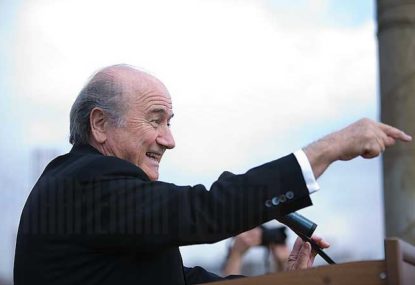Football’s World Cup is the biggest show on earth. More than 3.4 million people attended last year’s staging in Brazil, with a total of 11 million ticket applications received.
Billions of people across 214 nations watched the tournament on television.
Since 1930, the World Cup is where legends have been made or consolidated – names like Pele, Santos, Franz Beckenbauer, Diego Maradona, Ferenc Puskás, Johan Cruyff and Bobby Charlton all mesmerised fans on the sport’s biggest stage.
However, in the wake of last week’s arrest of members of the FIFA Executive Committee on charges of bribery, money laundering and racketeering, and the subsequent re-election of president Sepp Blatter, there has been talk of boycotts at the next World Cup.
But is it idle rhetoric or will confederations or individual nations boycott Russia 2018?
At the forefront with respect to turning their back on the next World Cup is the Union of European Football Associations (UEFA).
Former France international Michel Platini, the current UEFA president, has been extremely vocal in his criticism of FIFA, and with it, raising the threat of a European boycott. Platini says the UEFA delegates will speak in depth about the latest developments at a meeting in Berlin later this week ahead of the Champions League final between Barcelona and Juventus.
The fallout from that meeting will be closely scrutinised by both the media and Blatter.
English FA chairman Greg Dyke has ruled out a unilateral boycott, but says he would encourage and support a broader UEFA generated boycott. Before the FA Cup final at Wembley on Saturday, Dyke believed UEFA is not prepared for an all-out revolt at present, saying, “Certain countries would do it but not all of them.”
Dyke also says that it is critical that Platini bring all of UEFA onto the same page.
Doing so will not be easy.
Eighteen of the 54 European nations voted for Blatter, including Russia and its political allies and Spain and France, which would have been anathema to Platini. The rest of UEFA backed the incumbent’s rival, Jordanian Prince Ali bin al-Hussein.
The majority of South America voted against Blatter as well, and we know that Australia turned its back on the Swiss too.
Dyke has made some provocative comments about FIFA and Blatter, saying, “We don’t need his money. We can say what we like. More will start doing that. The Dutch have been doing it and even the Germans have started saying it.”
Europe and South America are pretty much the World Cup. A boycott by both continents or a majority of nations that qualify from both would be a massive blow to FIFA, and rob the tournament of its legitimate standing as the sport’s showcase and the decider of the world champion.
Financially many members of both confederations could survive without the 2018 World Cup. Though there is still an awful lot of water still to flow under the bridge between now and June 2018.
The US Justice Department has flagged that the recent arrests are only the beginning of the charges that over time will be made against FIFA officials and major corporate enterprises and media conglomerates which support it.
It may well be that Blatter will be forced to resign ahead of Russia 2018 as a result of the fallout from the legal charges that are mounting against his key personnel, both past and present.
Another factor that could hasten Blatter’s demise is the area of corporate support of FIFA.
As part of its current investigations, the US Justice Department is looking at Nike’s 10-year deal to supply kits to the Brazilian team. It is alleged that a separate $US40 million payment was made to the Brazilian FA over and above the $US160 million contract document.
The Justice Department is now considering whether the likes of McDonald’s, Coca-Cola and Nike – who each provide tens of millions of corporate dollars direct to FIFA – should continue to do so while the organisation is being investigated for widespread systemic fraud.
A forced withdrawal of such major international corporations would be a massive blow to Blatter’s stewardship. How long it will take for the legal actions to pass through the US courts is anyone’s guess.
To date Blatter has been the Teflon man. Over the coming months and years the wick will continue to be turned up beneath him. However, if he is still in office in the lead-in to Russia the heat will not only be on him but those that have spoken openly about boycotts.
Should they occur, the real losers will be the players who miss out on competing at the sport’s peak event.
By the time Qatar rolls around – if indeed it is still the venue in 2022 – it will mark the end of an eight-year period without a World Cup. Such a hiatus would be terminal to many players’ World Cup aspirations.
The fans would also be significantly poorer for having to watch a somewhat meaningless tournament in Russia if the big names were absent and FIFA chose to still go ahead with it.
But the bottom line in all this has to be the good of the sport into the future. The next three years will be a period of intrigue for the World Game and all who hold it dear.





























































































